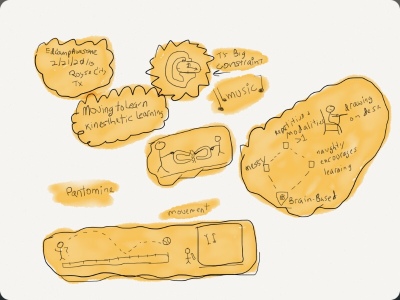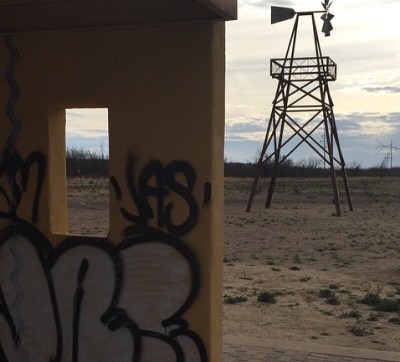PROLOGUE
Blackboards and college ruled notebook paper: Back when I started school these were the media teachers and students wrote on. Period. Mediums have, of course, evolved since then. During last Saturday's EdCampAwesome (session notes) in Royse City, Texas I had a glimpse on how much has changed.
DESKTOPS
One of the EdCampAwesome sessions I participated in was Moving to Learn/Kinesthetic Learning facilitatedby Cheri Froehling.
Which brings me to the adult learning environment I design for. Dry erase boards are everywhere in this space. Flip charts are common as well, providing places for notes to be written; hanging them on walls to be referred to later is a kind of group memory.
I wonder what might happen if the next training I develop has learners take notes or collaboratively work out problems on their tabletops? I haven't seen this done before, at least not with the encouragement of an instructor and the participation of others. I'm a big fan of the maker movement. Working out problems on something you think you shouldn't be writing on might make for an interesting learning activity.
In the adult learning spaces I design for learners working out problems collaboratively on their desktops might be a stretch. Maybe not. I don't know for sure but it's something to think about, talk about, and play with.
TABLET-OPS
Which brings me to a project I'm working on now. It involves design thinking and rapid prototyping. What would adult learning look like if learners worked out problems collaboratively using the mobile devices, smartphones and tablets, many use every day? I've learned tons from the teachers I meet at EdCamps I've been to in Texas, Arizona, and California. I'll be sharing what I've learned during my Mobile Rapid Prototyping Through AppSmashing concurrent session at the eLearning Guild's mLearn Conference in Austin, Texas this June.
EPILOGUE
The other EdCampAwesome session I attended was Flipping PD with Don Jacobs. It involved doing brief video clips, micro podcasts I guess, to share know-how with peers. So I think I'll give this a try soon. My weekend was EdCampAwesome.



